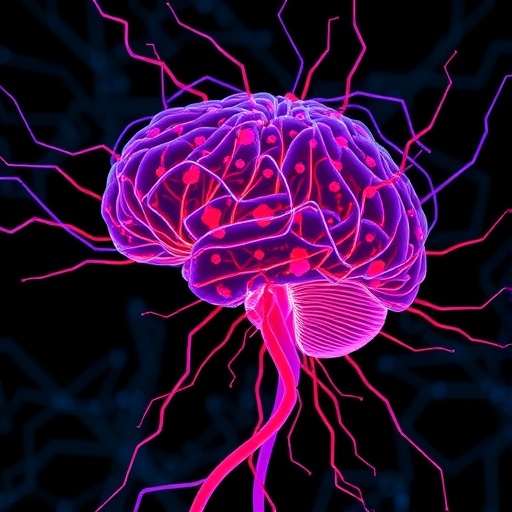In groundbreaking new research funded by the National Science Foundation, neuroscientist Leora Yetnikoff is embarking on a comprehensive five-year investigation into the enigmatic relationship between dopamine, a pivotal neurotransmitter, and myelin, the insulating sheath that envelops nerve fibers in the brain. This study aims to elucidate the mechanisms by which social isolation may induce detrimental changes in myelin, ultimately impairing neural communication and contributing to various neurological and psychiatric disorders.
Decades of research have established the catastrophic effects of social isolation on brain structure, particularly noting the degradation of myelin, the lipid-rich coating critical for the rapid transmission of electrical signals along axons. Yet the precise biological pathways linking environmental factors such as isolation to alterations in myelin have remained elusive. Yetnikoff’s research aims to bridge this gap by focusing on dopamine’s potential regulatory role in myelin plasticity.
Dopamine is traditionally recognized for its role in synaptic plasticity, motivation, and reward processing within the central nervous system. However, recent evidence suggests dopamine’s influence may extend beyond neurons, possibly interacting directly with oligodendrocytes—the specialized glial cells responsible for myelin production and maintenance. This novel hypothesis challenges longstanding views of neuronal and glial cell functions as discrete, instead proposing a dynamic interplay that modulates brain plasticity at multiple levels.
The core tenet of this research involves the novel concept that dopamine may modulate the plasticity of myelin sheaths, orchestrating adaptive changes in insulating layers that enhance or impair electrical conduction in response to environmental stimuli. If validated, this mechanism would represent a groundbreaking addition to the understanding of brain adaptability, highlighting myelin plasticity as a critical contributor to cognitive flexibility and neural resilience.
This study also has significant clinical implications beyond social isolation. Conditions such as traumatic brain injury, schizophrenia, addiction, and neurodegenerative diseases prominently feature abnormalities in dopamine signaling and demyelination. By delineating the molecular crosstalk between dopamine and oligodendrocytes, Yetnikoff’s research may illuminate novel therapeutic targets for a broad spectrum of neuropathologies characterized by white matter degradation.
In the context of social isolation, the effects on dopamine pathways and subsequent myelin disintegration bear mounting significance in a post-pandemic world, where loneliness and decreased social interaction are prevalent across diverse age groups. The neurobiological consequences of such isolation remain poorly understood, yet are critically important for public health interventions targeting cognitive decline and mental health disorders.
At the cellular level, the research employs state-of-the-art genetic and imaging technologies to trace dopamine’s impact on oligodendrocyte physiology. Advanced techniques such as in vivo two-photon microscopy, genetically encoded dopamine sensors, and transcriptomic profiling enable the precise mapping of dopamine receptor expression on oligodendrocytes and their functional response to fluctuating dopamine levels.
This multi-disciplinary approach allows for a high-resolution examination of how modulating dopamine affects the formation, maintenance, and plastic remodeling of myelin. Questions being addressed include whether dopamine promotes oligodendrogenesis, influences the metabolic support these glial cells provide to neurons, and how dopamine-driven myelin plasticity alters neural circuitry and behavioral outcomes.
Moreover, the project extends to studying how various forms of social isolation—ranging from chronic loneliness in the elderly to technological isolation in youth mediated by excessive screen time—impact these neurochemical and cellular pathways. This broad perspective seeks to contextualize the molecular findings within diverse real-world scenarios, enhancing the ecological validity of the research.
Of particular historical importance is the link between early-life psychosocial deprivation and myelin deficits established by studies on Romanian orphanage children, which revealed diminished myelination in key brain regions responsible for cognition and impulse control. Yetnikoff’s work builds on such foundational knowledge by investigating the translational potential of dopamine-modulated myelin plasticity as a mechanism for recovery or intervention.
The implications of this research are profound: not only could it redefine the biological underpinnings of brain plasticity, but it also offers hope for developing interventions that harness dopamine signaling pathways to restore myelin integrity. Such treatments could profoundly impact the prognosis of individuals suffering from multiple sclerosis, Parkinson’s disease, and other neuropsychiatric conditions where demyelination plays a critical role.
This project also serves as an invaluable training platform for emerging neuroscientists. Students involved with the Yetnikoff Laboratory will engage with pioneering technologies and interdisciplinary methodologies, gaining critical skills and contributing fundamentally to the research trajectory, underscoring the collaborative nature of cutting-edge neuroscience.
In addition to the NSF CAREER award backing this work, Yetnikoff has garnered significant recognition, including grants and accolades from prestigious institutions such as the Brain and Behavior Research Foundation and the National Institutes of Health. Her trajectory exemplifies the integration of rigorous molecular neuroscience with pressing questions in behavioral and clinical sciences.
Ultimately, this research signals a paradigm shift in neuroscience, proposing that myelin is a dynamic substrate responsive to neurochemical modulation, rather than a passive insulator. Understanding dopamine’s role in this process not only enriches basic science but also holds transformative potential for addressing the complex challenges posed by social isolation and neuropsychiatric disease in modern society.
Subject of Research: The role of dopamine in regulating myelin plasticity and its implications for brain function and disease.
Article Title: Investigating Dopamine’s Role in Myelin Plasticity: Unraveling the Neural Impact of Social Isolation
News Publication Date: Not specified
Web References:
- https://www.gc.cuny.edu/people/leora-yetnikoff
- http://yetnikoff.neuro.nyc/
- https://www.harvardmagazine.com/2022/12/right-now-deprivation-mark-on-brain
Image Credits: Alex Irklievski
Keywords: Myelin sheath, Dopamine, Behavioral epigenetics




